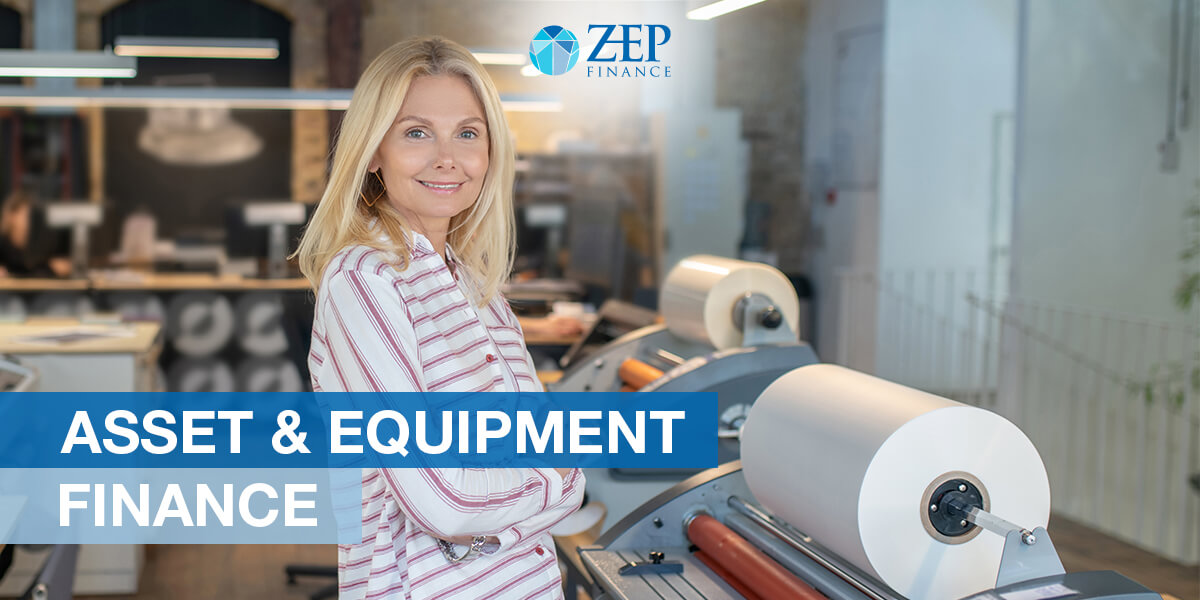
At ZEP Finance, we understand the pivotal role of asset and equipment finance in propelling businesses and individual ventures forward. But we also know that not all equipment loans are created equal. In fact, finding the right asset finance could mean the difference between success and failure. Fortunately, you’re not on your own – the experienced team at ZEP Finance is here to help.
Our dedicated team of brokers can guide you through the entire equipment finance process, ensuring you secure the best financing solution tailored to your needs. It’s not just about finding the equipment loan with the lowest interest rate – it’s about sourcing the right kind of finance product.
Our expert brokers can identify which loan structure and features will deliver the best finance solution to suit the needs of your business. We can then match you with a lender who offers the ideal mix of flexibility, features and competitive interest rates. When you work with ZEP Finance, you can rest assured that you’re getting the best finance deal to suit your business.

Asset and equipment financing is a specialised category of lending used by businesses and individuals to acquire essential assets and equipment. This kind of finance arrangement will allow you to secure the assets or equipment that you need without disrupting cash flow or negatively impacting your business capital.
An equipment loan is commonly used for the following scenarios:
No matter what kind of equipment purchase you’re planning, ZEP Finance can help you source a competitive finance arrangement.


Navigating the world of equipment and asset finance can be daunting. Many business owners dive in without fully understanding the nuances, resulting in less-than-ideal outcomes. They may secure an equipment loan, but the inflexible terms or restrictive features may hold them back from fully achieving their business goals.
At ZEP Finance, our brokers simplify the process for you. From initial consultation to finalising the loan paperwork, we’re with you every step of the way, ensuring clarity and confidence. We’ll answer all your questions, handle the research and even negotiate with lenders on your behalf to ensure you achieve the best possible result.
The first step is to fully understand the specific assets or equipment required for your business operations. If necessary, do research to see what kinds of equipment are considered the best investment for businesses in your industry.
Research the different kinds of asset or equipment finance available and decide which model will best suit your current needs and future goals. The most common types of equipment loans include lease, hire purchase, chattel mortgage, operating lease and novated lease. The best way to do this is by consulting with an experienced finance broker who can provide tailored advice.
Once you’ve identified your preferred lender and loan product, the next step is to submit an application to the finance provider. Your loan application will need to include details on the type of equipment and purchase cost, its intended purpose and any other relevant information requested by the lender.
The finance provider will complete a thorough assessment of your application. This may include checking the value of the asset, reviewing your business’s financial health and checking your creditworthiness.
Once your application has been approved, the finance provider will lay out the terms of the agreement, including interest rates, repayment schedules and any other conditions. Make sure you read through all of the details carefully so you have a complete understanding of the terms and conditions. You can then sign the necessary documentation to formalise the agreement.
Ensure that you make regular repayments as per the loan agreement. This could be monthly, quarterly or annually, depending on the terms of your loan.
Depending on the type of finance you’ve selected, you may be responsible for the maintenance and insurance of the asset. If this is the case, make sure you have adequate insurance and that routine maintenance is carried out to prolong the life of your asset.
At the end of the loan term, your next steps will be based on the type of finance arrangement you selected. This could involve taking full ownership of the asset, returning it or renewing the lease for another term.

A contractual agreement where the lessor (owner) provides the lessee (user) the right to use an asset for a specified period of time.
When you acquire an asset by paying in instalments – ownership is transferred once the final payment is made.

A loan agreement where the borrower provides a movable personal property (chattel) as security.
A vehicle lease agreement in which an employer, employee and a finance company enter into a three-party agreement.
An agreement where the lessor retains the risks and rewards of ownership. The lessee may have the option to renew or purchase at the end of the term.

The ability to access and finance equipment or other business assets can make a significant difference to the success of an enterprise. As businesses in various sectors look to stay competitive and efficient, understanding the types of assets and equipment that can be financed becomes crucial.
It’s worth noting that businesses can typically use finance leases to fund any tangible asset, except real estate. If you’re considering a particular type of asset finance or you’re planning to finance a piece of equipment, start by talking with one of our finance brokers and get the kind of help that only ZEP Finance can provide.

Asset and equipment finance is just one aspect of business lending. Whether you’re planning to purchase a work vehicle, industrial equipment or a commercial property, your first step should always be contacting a finance broker.
At ZEP Finance, we can assess your situation and advise what kind of information we’ll need to start researching the perfect loan for your business.
Why not take a few minutes to watch an informative video where our Director, Zain Peart, discusses the basics of business loans?
Incorporating asset and equipment finance into a business strategy can provide a competitive edge, financial flexibility and the means to drive growth and innovation. Here are just some of the benefits you get when you decide to add an equipment loan to your business plans:
Equipment financing allows businesses to preserve their working capital by spreading the cost of asset purchases over an extended period. This helps to ensure they still have funds available for other operational needs.
Businesses can access the latest equipment and technology without the hefty upfront costs. This allows them to remain competitive and efficient as technology evolves over time.
Depending on the structure of the finance agreement, businesses can potentially claim tax deductions on interest payments, depreciation or lease expenses. This can make equipment finance an attractive option for many business owners. For more advice on the kind of tax benefits you may be eligible for, talk to a licensed tax professional.
Fixed financing means businesses are not subject to fluctuating interest rates. This can provide greater stability for businesses looking to balance their ongoing repayments with their day-to-day cash flow.
Some finance agreements, like leases, may include asset disposal or upgrade options at the end of the term. This effectively eliminates the hassle of selling outdated equipment that you no longer require. This can be a great option when acquiring equipment for a specific project or to meet seasonal demand.
Asset financing often bundles additional costs into the agreement, such as installation, maintenance or even staff training. This provides businesses with a comprehensive solution that includes all of the necessary expenses.
By financing and using the equipment immediately, businesses can potentially generate revenue faster. For example, rather than saving up to purchase a larger piece of machinery that will increase profit and reduce costs, an equipment loan will allow you to purchase that machinery now. This could help to deliver a quicker ROI.
At the end of the finance term, businesses may have the option to purchase the asset, return it or even upgrade to a newer model, depending on the type of agreement.
With the rapid pace of technological advancements, equipment can quickly become outdated. Financing allows businesses to upgrade or replace assets more frequently, ensuring they always have access to the latest tools and technology.
Asset and equipment finance can be tailored to meet the specific needs of the business. This allows for greater flexibility regarding the type of asset, the length of the finance term and the repayment structure.


We specialise in understanding the complexities of different equipment finance options. This allows us to provide expert advice on the most suitable finance products to suit the needs of your business.
We have an extensive panel of lenders, giving us access to a wider range of loan products. This means you can have total peace of mind that you’re not missing out on a more competitive deal somewhere else.

We understand that you probably have a lot on your plate. That’s why we take care of all the research, paperwork and negotiations, saving you valuable time so you can stay focused on the more important things.
One size does not fit all when it comes to asset financing! That’s why we’ll start by assessing your unique financial situation and business requirements and then recommend a solution personalised to suit your long-term goals.

We have established relationships with our panel of lenders, which means we have access to better terms, rates and conditions. We can also negotiate on your behalf to achieve flexible and competitive financing terms.

Our expert brokers will guide you through the entire application and approval process, ensuring all paperwork is prepared correctly and submitted on time. This streamlines the process and avoids any unnecessary delays.
Asset financing is a type of borrowing related to a company’s assets. It allows companies to use their existing inventory, accounts receivable or short-term investments to secure short-term financing.
There are two primary ways:
Asset financing offers financial flexibility by increasing short-term funding and working capital. It’s an effective alternative when a company might not qualify for traditional financing.
The most common types include:
This type of financing offers flexibility to support various asset and equipment needs. Terms can range from 1 to 7 years, allowing businesses to tailor plans to their specific requirements.
Details such as the type and cost of the equipment, whether it’s new or used, its intended purpose, the proposed loan term duration and expected repayments are essential.
Lenders typically look at the equipment valuation, direct debt service coverage (ensuring the new equipment can generate enough profit to cover the loan) and the borrower’s credit score.

ZEP Finance Pty Ltd ABN 44 139 018 643
Credit Representative 374069 is authorised under Australian Credit Licence Number 389328
Mortgage Brokers Lennox Head | Home, Land, Investment Loans Byron Bay, Ballina, Northern Rivers & Lismore
Location
5/74 Ballina St, Lennox Head, NSW, 2478
Email Address
Phone
Copyright 2022 © Zep Finance